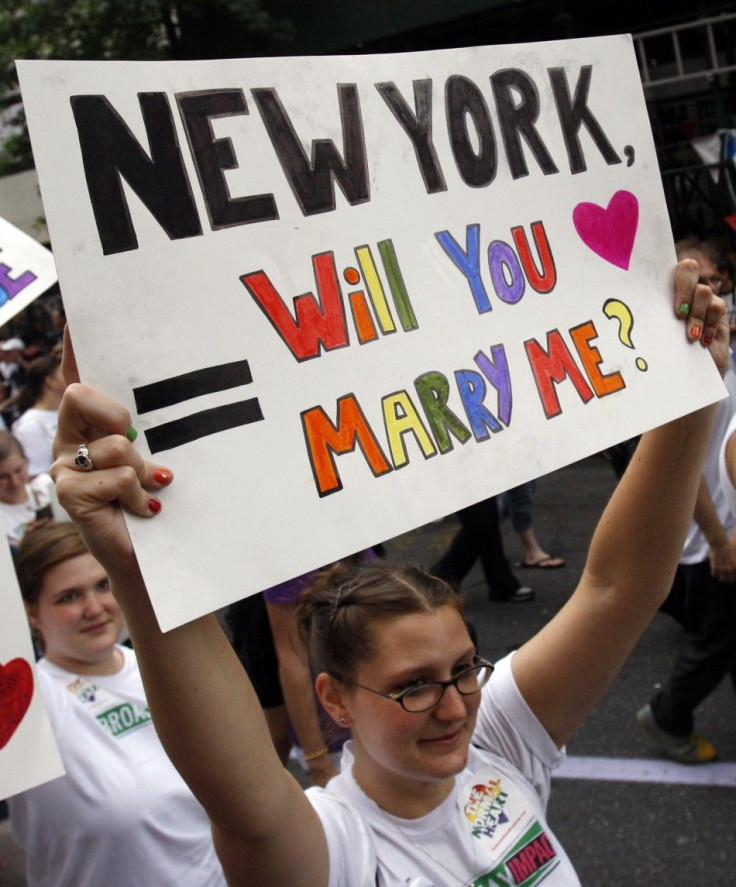New York Same-Sex Marriage: What New Law Does and Does Not Do

Weary state senators have returned home, the scenes of ebullient same-sex couples thronging the streets in Greenwich Village have subsided into memory, and New York City is sweeping up the detritus of a Gay Pride parade charged with historical meaning.
In the wake of New York becoming the sixth and largest state to legalize same sex marriage, couples face a practical question: what does this law do?
It does not grant gay couples the same status as other married couples -- a federal law prohibiting same-sex marriage blocks many benefits, protections for religious organizations leave open the possibility of legally sanctioned discrimination and couples not from New York will need to contend with a patchwork of laws that vary from state to state. But the legislation confers a range of privileges, from inheritance to sharing a spouse's health care or pension to procedures for dividing assets and custody after a divorce, that allow same-sex couples the rights of marriage.
Marriage is really a set of default rules between the couple, so it helps order what happens if someone gets sick, if someone dies, if you have dissolution, said Brad Sears, Executive Director of the University of California, Los Angeles' Williams Institute on Sexual Orientation Law.
There's a set of rules and policies you follow, there's a way to distribute income, there's a right to take care of each other.
The legal ramifications of marriage do not always translate into a direct benefit for both partners, Sears noted. He cited government programs for low-income populations that a person might no longer be eligible for once their spouse's income is considered. But that reflects the deeper commitment marriage both entails and enables, Sears said.
I think it demonstrates that when people get married, among the obligations is that you're supposed to take care of each other's basic needs, he said.
Because New York does not have a residency requirement, it will likely become a destination for same-sex couples wishing to marry. But the extent to which those marriages are recognized in other states depends partly on state law -- some states allow domestic partnerships, while others do not recognize any form of same-sex union -- and partly on the type of right. If a married couple gets into a car accident in a state that does not recognize same-sex marriage, there is a fair chance a spouse would get hospital visitation rights. The same is not true of tax benefits.
A central point of contention holding back the bill's passage was whether religious organizations could deny same-sex couples services without fear of legal repercussions. The legislation ultimately included exemptions not just for clergy refusing to perform marriage ceremonies, but for services provided by any type of religious organization.
Sarah Warbelow, state legislative director for the Human Rights Campaign, said that the provision would allow some forms of discrimination, such as denying access to church-related day-care services, but should not prevent same-sex couples from seeking to adopt children through religiously affiliated organizations.
We're going to have to see how this plays out in the courts to some extent, Warbelow said. We feel fairly confident that this will not affect adoption rights. There are very clear laws predating this bill and this bill does not address adoption explicitly in any way.
The Defense of Marriage Act (DOMA) will continue to bar same-sex couples from receiving federal benefits -- 1,138 of them, according to Human Rights Campaign -- that include Medicaid and Social Security benefits. Immigration law prioritizes family unification, granting permanent residence status to an immigrant who marries a citizen -- but not if they are the same sex.
President Obama dealt DOMA a blow when he instructed the Justice Department to cease defending the law in court, but the federal ban on same-sex marriage remains the law of the land. That means the push for marriage equality will continue to proceed on a state-by-state basis.
Suzanne Goldberg, Director of Columbia Law School's Center for Gender and Sexuality, said that New York's law could provide fresh momentum.
New York's marriage law will reverberate around the country in a different way politically, Goldberg said. There's a certain moral and political force that comes with New York granting marriage equality after such a tough fight here, simply because New York is such a large and influential state.
© Copyright IBTimes 2024. All rights reserved.





















